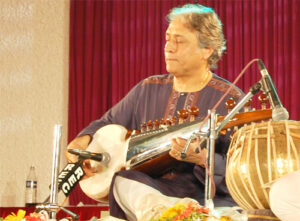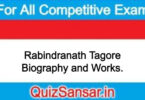Ustad Amjad Ali Khan Biography and Works.

Born on October 9, 1945 in Gwalior, Ustad Amjad Ali Khan is a noted sarod player.
He belongs to the Bangash lineage and is the sixth generation sarod player in his family. He learnt sarod under his father, Haafiz Ali Khan’s tutelage, who was also a musician to the royal family of Gwalior.
Amjad Ali Khan got the opportunity of his first solo recital at the age of 12 in 1958. Having developed a unique style of playing the sarod, he is considered one of the foremost classical musicians. The key innovations in his style are compositions based on vocal music, the technical ability to play highly complex phrases (ekhara taans) on the sarod spanning three octaves and the emphasis on simple and elegant compositions.
He has simplified the instrument by removing some strings and has also removed the resonant gourd (tumba) which is in use by the other sarod schools.
Amjad Ali Khan founded the Ustad Hafiz Ali Khan Memorial Society in 1977, which organizes concerts and bestows an annual ‘Hafiz Ali Khan Award’.
Ustad Amjad Ali Khan has performed in different parts of the world at various national and international festivals.
His family arranged a marriage for him, but that failed, and Khan got married second time to Bharatanatyam dancer Subhalakshmi in 1976. The couple has two sons – Amaan and Ayaan – who were taught music by their father.
He is the recipient of many awards and honours. These include: The Padma Shri (1975), Sangeet Natak Academy Award (1989), the Tansen Award (1989), the Padma Bhushan (1991) and the International Music Forum Award, UNESCO in 1970.
Trivia
Amjad Ali Khan is a Muslim and his wife, Subhalakshmi is a Hindu. Their family home in Gwalior was made into a musical centre and they live in New Delhi.
- What is meant by Database Management System?
- Discuss the advantages and drawbacks of database.
- What do you mean by database ? Discuss its Characteristics.
- What is Data Mining?
- What are the conditions of communication?
- What do you mean by business communication ?
- organization / Differentiate between classical and modern theory of organization
- What is forecasting






